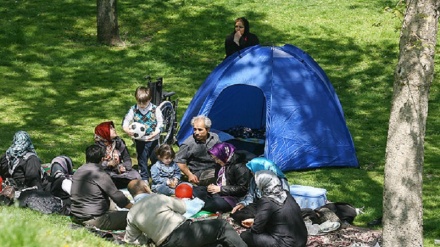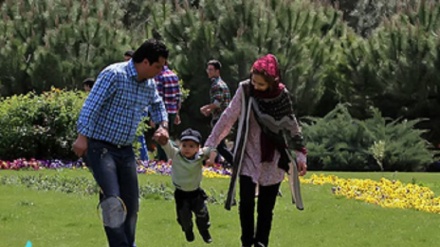Iranian family (11)
Welcome to this week's episode of the series "Iranian Family". Being in pairs is a general concept in all creatures, one of which is mankind. Today, we discuss this topic of importance.
There are a number of pre-marriage ceremonies within Iranian families. In fact, wedding ceremonies maintain their own customs and traditions in every country. These traditions are either rooted in religious beliefs or the culture of the related nation. The significance of this fact is to an extent that everyday dozens of articles are authored about this topic of importance. Nonetheless, there are still some points that writers may not refer to. These customs and traditions are not limited to purchase of a cake or a wedding ceremony. Sociologists opine that the common customs and traditions in a given community are manifestations of the culture and civilization of that society.
For a marriage to be successful, each of the spouses should appropriately and sufficiently know each other. The proposal ceremony raises an opportunity for both of the would-be spouses to talk to each other and become familiar with each other's characteristic traits and manners.
In Iran, it is customary for the mother and sister of the would-be groom to find a suitable girl for him. Then, they talk to him, so that in case of his agreement, the proposal ceremony would be convened. Throughout the proposal ceremony, usually a number of women from the suitor's family attend the would-be bride's house to see her and get to know her as much as possible. The would-be bride hosts the suitor's family and responds to their questions. After tea is served; the suitor's family get to the point; if they find the would-be bride suitable. Otherwise, they would leave the girl's house after a while.
If the two would-be spouses form a positive viewpoint toward each other, the next meeting would be held in the presence of the suitor. In this meeting, the boy and the girl talk to each other in order to get to know each other as much as possible. At the end of the meeting, if the would-be spouses have developed a good view toward each other, a gift is presented to the would-be bride.
Afterwards, the boy and the girl talk to each other on a number of occasions, paving the way for another ceremony; within which the leading members of families gather to discuss the dowry and the conditions of marriage. In the meantime, the suitor's family present a wedding ring, the wedding gown, chador garment, a headscarf, as well as a bunch of flowers and confectionary to the bride.
Furthermore, the commitments and remarks which have been made are written on a piece of paper and signed. Thereafter, the family members make the necessary arrangements for the engagement ceremony, while sharing their happiness with others.
Today, some of the Iranian families have distanced from traditional proposal ceremonies. In these cases, the role played by the families of the suitor and would-be bride has partly faded away and they only play a ceremonial role, while the related boy and girl have previously seen each other in the workplace or have partly known each other after a number of meetings. Therefore, the family does not play the main role in selection of the future spouse of their child. Given that youths, in this important selection, are rather inexperienced and mainly dependent on their emotions, they are more likely to experience failures later in the choices that they have made.
There are a number of important points which should be fulfilled in the relationship between spouses in the family.
There are a number of Islamic sources which have referred to the need for presence of a hierarchy of power in the family. Within the 34th ayah of Surat al-Nisa in Holy Quran, God Almighty has pointed out the guardianship of women by men and has referred to the innate and learned differences between men and women as the reason for it.
Meanwhile, man is duty-bound to meet the conventional needs of family by making further efforts, which is referred to as provision of the alimony. Meanwhile, according to Islamic narrations, the alimony that the man provides should be in line with the woman's dignity and needs and the woman should not feel deprived and disheartened in her husband's house. In fact, the man should provide for his family's welfare, coupled with good manners, good remarks, generosity, and maintenance of his modesty.
The Prophet of Islam, Mohammad (Blessings of God upon him and his progeny), notes that woman is the supporter of her family, husband, and her children. In other words, woman is the manager of the house and the family.
In the view of religious experts, this difference between men and women is highly effective in advancement of the goals of life; and the outcome of this interaction is the growth and elevation of the spouses; and strong emotional bonds between the family members. This is because the guardianship of the family has been delegated to the man, based on his innate characteristic traits, and this guardianship will be carried out in the best possible manner when the woman prudently accepts this role of her husband and abides and supports her husband, in his efforts to guide his family's life.
MR/ME


